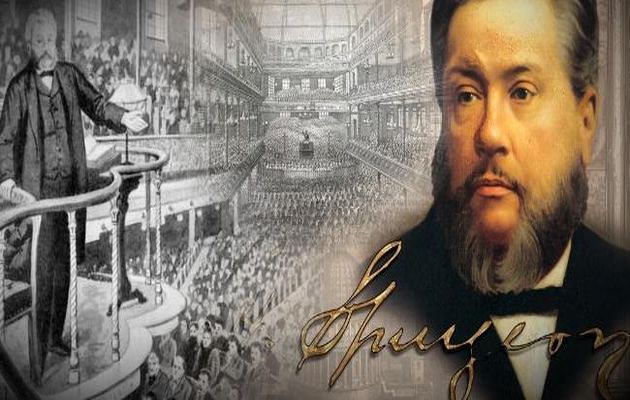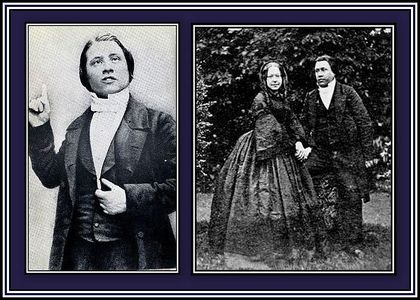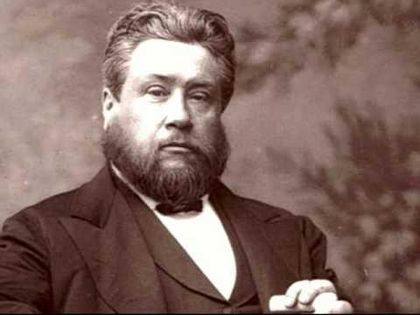A closer look at Spurgeon's teaching on regeneration.

As with every last week of January, we Evangelicals do well to reflect upon the life and legacy of the ‘prince of preachers’, Charles Haddon Spurgeon (1834-92).
The great champion of the faith died on 31st January 1892 after a five-year-long fight against a brand of theological liberalism which was tearing his beloved Baptist Union apart. His beloved wife Susannah wrote, “His fight for the faith has cost him his life. Yet he never regretted the step he had taken; for, through the whole affair, he felt such a divine compulsion as Luther realized when he said, ‘I can do no other’”.
Spurgeon’s zeal for biblical truth in the midst of controversy stemmed from his two greatest pleasures in life: communion with Christ and the preaching of the Gospel. It is nigh on impossible to find a single Spurgeon sermon without some reference to the beauty and perfections of Christ or to the glorious Gospel of God. That is some feat if we take into account that his messages fill 63 volumes (some 20-25 million words)!
If Spurgeon were with us today, he would doubtlessly publish some mediation upon the wonderful saving work of Emmanuel. So we turn to this grand theme today under the banner of ‘The New Nature’, a message preached by our beloved Protestant forefather on 30th June 1861 at the Metropolitan Tabernacle. The young preacher had just turned a wholesome twenty-seven years old.
Spurgeon’s text that Sunday summer morning was 1 Peter 1:23-25, “Being born again, not of corruptible seed, but of incorruptible, by the word of God, which lives and abides forever. For all flesh is as grass, and all the glory of man as the flower of the grass. The grass withers, and the flower thereof falls away: but the word of the Lord endures forever. And this is the word which by the Gospel is preached unto you”.
Before dividing the passage up into three points, Spurgeon gave a brief introduction to put the text into context. Believers, he reasons, are singularly privileged because their glory far exceeds that of a mere mortal crown (as in the case of kings).
What Christ’s disciples have received is a new nature, something deep within that transforms their manner of living. This radical change –or new birth- explains why saints “cleave to holiness and hate the very appearance of evil”.
The three points are easy to follow: first of all, a comparison between the natural birth and the new birth; secondly, the different consequences of the two births; and lastly, a contrast between the glory of the two natures.
1.- A comparison between the natural birth and the new birth
Spurgeon explains that both the natural birth and the new birth have various traits in common. First of all, they are both mysterious. Although we know the efficient cause of each birth (parents in the case of the natural and the Spirit of God with respect to the supernatural), there is an inexplicable moment when life sparks forth.
 On the left, a young Spurgeon preaching. On the right, Spurgeon with his beloved wife, Susannah.
On the left, a young Spurgeon preaching. On the right, Spurgeon with his beloved wife, Susannah.Our preacher proclaims, “How the Spirit of God openeth upon the mind, how it is that he renews the faculties and imparts fresh desires by which those faculties shout be guided, how it is that he enlightens the understanding, subdues the will, purifies the intellect, reverses the desire, lifts up the hope, and puts the fear in its right channel, we cannot tell, we must leave this among the secret things which belong unto God”.
Secondly, both births signify an entrance into life (one earthly the other celestial). Thirdly, both lives are dependent on external forces. Fourthly, the life communicated also entails certain temperaments, propensities and dispositions.
Whereas a child may inherit certain physical and psychological factors from his (her) parents, the regenerated soul inherits a rich longing for Christ and a desire for holiness. Fifthly, both lives are complete but require development.
As well as honing in upon the similarities between the two births, Spurgeon also brings the differences to our attention. The natural birth has to do with a “corruptible seed” which fuses an evil virus into the newly born creature, namely, original sin (Psalm 51). The human birth also leads to numerous uncertainties and troubles.
Maybe the babe will come to curse the day on which it was born. The infant may also come to break its parents’ hearts by becoming a criminal or something worse.
But, blessed be God, the new birth is of an “incorruptible seed” which is sinless and perfect. This vital principle is the sure guarantee that, “they who are the sons of God shall never break their Father’s heart”.
Thus continues our preacher, “Their new nature shall be worthy of Him that gave it existence. They shall live to honour Him, they shall die to be perfectly like Him, and shall rise to glorify Him ever and ever”.
Before bringing his first point to a close, Spurgeon felt obliged to correct two erroneous doctrines regarding regeneration which live on in today’s theological world.
On the one hand, the London-based pastor hit out at the Roman Catholic teaching regarding baptismal regeneration. Scripture refutes such a nation, argues Spurgeon, as Jesus taught the doctrine of the new birth to a fully grown man (Nicodemus) and not to an infant.
Although Nicodemus had been circumcised, he was not yet born again. “Some tell you that the child is regenerated when the drops fall from his priestly fingers. My brethren, a more fond and foul delusion was never perpetrated upon earth. Rome itself did never discourse upon a wilder error than this”.
On the other hand, Spurgeon was equally critical of the liberal wing of the church who thought that regeneration was a matter of socio-political change. “And you, philanthropists, who think that building new cottages, using fresh plans for drainage, teaching the poor economy, will be the means of emparadising the world; I pray you go further than such schemes as these. You must change the heart”. Only supernatural regeneration can effectually transform the soul and life of fallen humankind.
Given this reality, Spurgeon urged the parents of his congregation to press home the need of the new birth to their children. Christian parents should never be satisfied to make blameless moral citizens out of their kids; but they should cry out continually to God for the new birth.
2.- The different consequences of the two births
Since the natural birth is of a corruptible seed, the days of the babe are numbered. As Peter sates, “All flesh is as grass”. Here today, gone tomorrow! In a particularly poignant moment of the sermon, Spurgeon offers the following reflection about the vanity of natural life,
“We are not living, brethren, we are dying. We begin to breathe, and we make the number of our breaths the less. Our pulse is "beating funeral marches to the tomb." The sand runs down from the upper bulb of the glass, and it is emptying fast. Death is written upon every brow. Man, know that thou art mortal, for thou all art born of woman. Thy first birth gave thee life and death together. Thou dost only breathe awhile to keep thee from the jaws of the grave, when that breath is spent, into the dust of death thou tallest there and then”.
In contrast to the verdict of death passed upon all mortal life, the good news is that the life given by the Holy Spirit in the new birth is immortal. Not even natural death will be able to separate us from the new principle of life wrought within us by God Himself.
The child of God can rest in perfect peace knowing that his salvation resides entirely in the hands of an almighty Lord. Not only has God sent the Spirit to continually supply us the benefits of a new life in ongoing union with the blessed Son of God (Christ), but He has also pledged to keep us until the end. “I give unto my sheep eternal life, and they shall never perish, neither shall any pluck them out of my hand”. “My Father which give them to me is greater than all, and none shall pluck them out of my Father’s hand”.
Since God has thus promised to keep His own, believers can enjoy a full assurance of Gospel salvation! The Lord will not allow His beloved ones to perish. They can apply the words of King David to themselves, “You will not leave my soul in hell nor will you suffer your holy one to see corruption”. In Christ, we are redeemed from eternal death.
3.- A contrast between the glory of the two births
As well as grass, Peter also makes mention of the flower. The flower comes up after the grass yet fades away sooner. Such is the glory of nature and such is the glory of the human birth.
 Spurgeon continues to be one of the most widely-read and studied preachers in contemporary Christendom.
Spurgeon continues to be one of the most widely-read and studied preachers in contemporary Christendom.Spurgeon pinpoints five key areas where humanity is prone to glory: physical beauty, strength, eloquence, knowledge and wisdom. In every case, such gifts take a long time to develop and then they flourish for but a short time.
Soon the effects of aging and decay do away with all of humankind’s grandeur and quite frequently, long before dying, men and women lose the charms and glories that characterized their lives in earlier years.
Not so, however, with the new birth! The glories of the new nature are ever increasing. True beauty, reveals Spurgeon, “is to be like the Lord Jesus”. Even when we die, we shall be like Him. The likeness shall not be marred.
True strength is that given by the Holy Spirit to drive us unto perfection. True eloquence is crying out “Abba, Father” to attract the attention of the Most High. True knowledge and wisdom are all summed up in Christ.
The new birth, therefore, is far superior to anything related to our natural birth.
Conclusion
We could do no better than to conclude this message with the words of Spurgeon himself:
“The only question we have to ask […] is —are we born again? Brethren, it is impossible for you to possess the existence of the new life without the new birth, and the glory of the new birth you cannot know without the new heart. I say —are you born again?”
“Do not stand up and say, "I am a Churchman, I was baptized and confirmed". That you may be, and yet not be born again. Do not say, "I am a Baptist, I have professed my faith and was immersed". That you may be, and not be born again Do not any, "I am of Christian parents". That you may be, and yet be an heir of wrath, even as others.”
“Are you born again? Oh! souls, may God the Holy Ghost reveal Christ to you, and when you come to see Christ with the tearful eyes of a penitential faith, then be it known unto you that you are born again and that you have passed from death unto life, "He that believeth and is baptized shall be saved, he that believeth not shall be damned." God help you to believe!”

Las opiniones vertidas por nuestros colaboradores se realizan a nivel personal, pudiendo coincidir o no con la postura de la dirección de Protestante Digital.
Si quieres comentar o